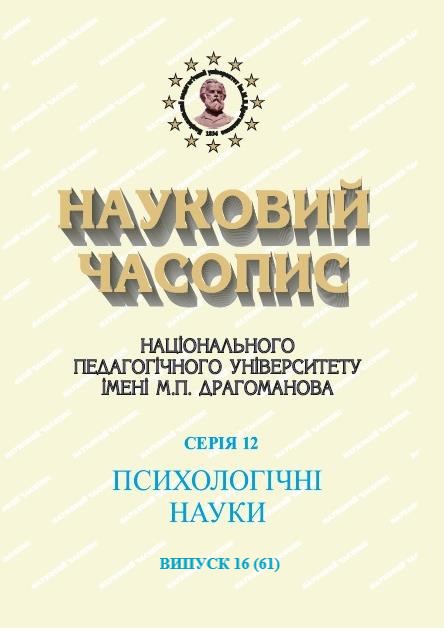PSYCHOLOGICAL FEATURES OF MOTIVATION, STYLES OF CONFLICT BEHAVIOR AND VALUE SPHERE BETWEEN ADOLESCENTS AND THEIR PARENTS
DOI:
https://doi.org/10.31392/NPU-nc.series12.2021.16(61).09Keywords:
motivation, style of conflict behavior, terminal, instrumental values, adolescence.Abstract
Purpose: analysis of psychological features of motivation, styles of conflict behavior and value sphere between adolescents and their parents.
Research methods: theoretical (analysis, comparison, generalization, interpretation of theoretical approaches and empirical research); empirical (testing); methods of mathematical statistics (Student’s criterion was used to identify differences in psychological characteristics of motivation, styles of conflict behavior and values in adolescents and their parents). Results. It is determined that the leading motives, features of behavior in conflict situations and values of adolescents and their parents differ significantly. Conclusions. It was found out that the adolescent group is characterized by high expressiveness of such variables as “Motivation for full acceptance of the partner in behavior”, “Motivation by the conflict between government and affiliation”. Among the terminal values, the most significant are: friends, entertainment, love and freedom. The least pronounced proved to be happiness of the others, knowledge and interesting work. Such variables as courage, independence and sense of humor are on high level of instrumental value formation. The least pronounced are education, rationalism and truthfulness. Parents have a high level of formation of such variables of instrumental values as self-control, tolerance and discipline. The specifics of conflict behavior styles are identified: parents try to maintain their authority, which is reflected in their assessment of parental and adolescent differences, as well as the creation of a situation of constant psychological pressure and inability of the family to meet the emotional support and sympathy of adolescents.
References
- Anopriienko, O.V. (2017). Styl batkivskoi povedinky yak chynnyk vynyknennia i podolannia khronichnoho stresu v pidlitkovomu vitsi [Style of paternal behavior as factor of origin and overcoming of chronic stress is in teens ]. Candidate’s thesis. Kyiv [in Ukrainian].
- Honchar, L.V. (2017). Formuvannia humannykh vzaiemyn batkiv z ditmy molodshoho shkilnoho i pidlitkovoho viku [Formation of humane relations of parents with children of primary school and adolescence]. Kyiv : TOV «Zadruha» [in Ukrainian].
- Dubrov, D.Y. (2020). Ynformatsyonno-kommunykatsyonnye tekhnolohyy y semeinye otnoshenyia: vred yly polza [Information and communication technologies and family relationships: harm or benefit]. Sotsyalnaia psykholohyia y obshchestvoSocial psychology and society, 11(1), 72–91. https://doi.org/10.17759/sps.2020110105 [in Russian].
- Kreidun, N.P., & Soroka, A.V. (2015). Prykladna psykholohiia: navchalnyi posibnyk [Applied psychology: a textbook]. Kharkiv : Kharkivskyi natsionalnyi universytet
imeni V.N. Karazina [in Ukrainian]. - Priba, H.A., & Kaliuzhna, Ye.M. (2020). Psykholohiia osobystosti na suchasnomu rynku pratsi [Psychology of personality in the modern labor market]. Kherson : OLDI-PLUS [in Ukrainian].
- Soldatova, H.U., & Lvova, E.N. (2018). Osobennosty rodytelskoi medyatsyy v sytuatsyiakh stolknovenyia podrostkov s onlain-ryskamy [Features of parental mediation in situations of adolescents facing online risks]. Psykholohycheskaia nauka y obrazovanye – Psychological science and education, 23(3), 29–41. https://doi.org/10.17759/pse.2018230303 [in Russian].
- Soroka, A.V. (2010). Yurydycheskaia psykholohyia. Kratkyi kurs: Uchebno-metodycheskoe posobye [Legal psychology. Short course: Textbook]. Kharkov : Kharkovskyi natsyonalnуi unyversytet imeni V.N. Karazina [in Russian].
- Tokareva, N.M. (2014). Suchasnyi pidlitok u systemi psykholoho-pedahohichnoho suprovodu [The modern teenager in the system of psychological and pedagogical support]. Kryvyi Rih [in Ukrainian].
- Abar, C.C., Farnett, S., Mendola, K., Koban, K., & Sarra, Sh. (2018). Relationships between parent-child social media interactions and health behaviors. Journal of Substance Use, 23(3), 335–337.
- Karmakar, R. (2017). The impact of perception of consistency and inconsistency in parenting style on pro-social motives of adolescents. Sotsial’naia psikhologiia i obshchestvo, Social Psychology and Society, 8(2), 101–115. https://doi.org/10.17759/sps.2017080207

